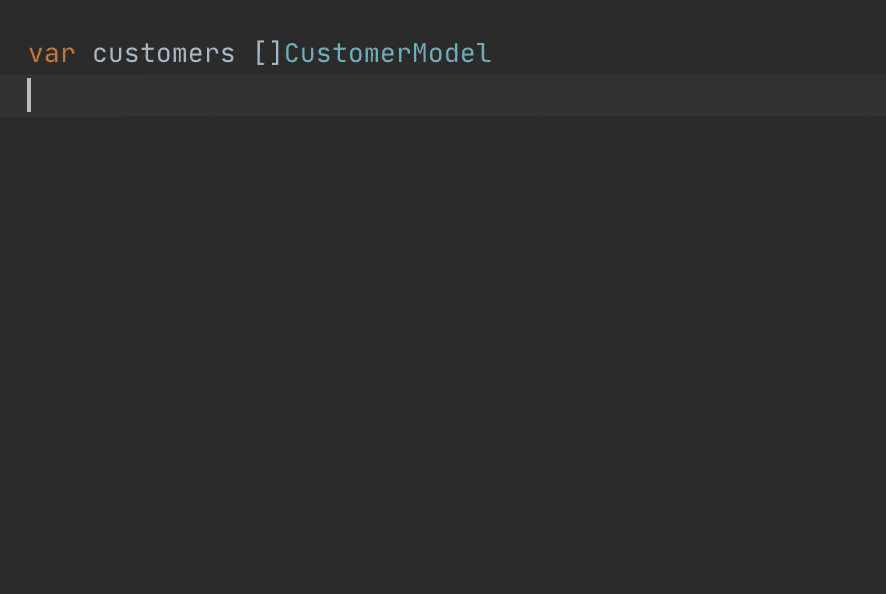Ecosyste.ms: Awesome
An open API service indexing awesome lists of open source software.
https://github.com/lqs/sqlingo
💥 A lightweight DSL & ORM which helps you to write SQL in Go.
https://github.com/lqs/sqlingo
database go golang mysql orm sql-dsl sqlbuilder
Last synced: 24 days ago
JSON representation
💥 A lightweight DSL & ORM which helps you to write SQL in Go.
- Host: GitHub
- URL: https://github.com/lqs/sqlingo
- Owner: lqs
- License: mit
- Created: 2018-11-18T14:11:03.000Z (over 5 years ago)
- Default Branch: master
- Last Pushed: 2024-03-20T08:42:57.000Z (2 months ago)
- Last Synced: 2024-04-17T22:17:31.303Z (about 1 month ago)
- Topics: database, go, golang, mysql, orm, sql-dsl, sqlbuilder
- Language: Go
- Homepage:
- Size: 343 KB
- Stars: 369
- Watchers: 12
- Forks: 28
- Open Issues: 2
-
Metadata Files:
- Readme: README.md
- License: LICENSE
Lists
- awesome-go - sqlingo - A lightweight DSL to build SQL in Go. (Database / SQL Query Builders)
- awesome-go - sqlingo - A lightweight DSL to build SQL in Go. (Database / SQL Query Builders)
- awesome-go-cn - sqlingo
- awesome-go-extra - sqlingo - 11-18T14:11:03Z|2022-08-21T17:16:00Z| (Generators / SQL Query Builders)
- awesome-go - sqlingo - A lightweight DSL to build SQL in Go. (Database / SQL Query Builders)
- awesome-go-cn - sqlingo
- awesome-go - sqlingo - A lightweight DSL to build SQL in Go. (Database / SQL Query Builders)
- awesome-go - sqlingo - A lightweight DSL to build SQL in Go. (Database / Advanced Console UIs)
- awesome-go-projects - sqlingo - A lightweight DSL to build SQL in Go. (Database / Standard CLI)
- awesome-go - sqlingo - A lightweight DSL to build SQL in Go. (Database / SQL Query Builders)
- awesome-go-cn - sqlingo
- awesome-go-stars - sqlingo(stars: 367) - A lightweight DSL to build SQL in Go. (Database / SQL Query Builders)
- awesome-Char - sqlingo - A lightweight DSL to build SQL in Go. (Database / Advanced Console UIs)
- awesome-go-with-stars - sqlingo - A lightweight DSL to build SQL in Go. (Database / SQL Query Builders)
- awesome-go - sqlingo - A lightweight DSL to build SQL in Go. (Database / Advanced Console UIs)
- repo-1316-awesome-go-cn - sqlingo
- repo-1211-awesome-go-cn - sqlingo
- go-awesome-cn-star - sqlingo
- Go-awesome - sqlingo - A lightweight DSL to build SQL in Go. (Database / SQL Query Builders)
- awesome-go-zh - sqlingo
- awesome-go - sqlingo - A lightweight DSL to build SQL in Go. (Database / SQL Query Builders)
- awesome-go - sqlingo - A lightweight DSL to build SQL in Go. (Database / Advanced Console UIs)
- awesome-go - sqlingo - A lightweight DSL to build SQL in Go. (Database / SQL Query Builders)
- awesome-go - sqlingo - A lightweight DSL to build SQL in Go. (Database / SQL Query Builders)
README

[](https://github.com/avelino/awesome-go)
[](https://pkg.go.dev/github.com/lqs/sqlingo?tab=doc)
[](https://app.travis-ci.com/github/lqs/sqlingo)
[](https://goreportcard.com/report/github.com/lqs/sqlingo)
[](https://codecov.io/gh/lqs/sqlingo)
[](http://opensource.org/licenses/MIT)
[](https://github.com/lqs/sqlingo/commits)
**sqlingo** is a SQL DSL (a.k.a. SQL Builder or ORM) library in Go. It generates code from the database and lets you write SQL queries in an elegant way.

## Features
* Auto-generating DSL objects and model structs from the database so you don't need to manually keep things in sync
* SQL DML (SELECT / INSERT / UPDATE / DELETE) with some advanced SQL query syntaxes
* Many common errors could be detected at compile time
* Your can use the features in your editor / IDE, such as autocompleting the fields and queries, or finding the usage of a field or a table
* Context support
* Transaction support
* Interceptor support
* Golang time.Time is supported now, but you can still use the string type by adding `-timeAsString` when generating the model
## Database Support Status
| Database | Status |
------------- | --------------
| MySQL | stable |
| PostgreSQL | experimental |
| SQLite | experimental |
## Tutorial
### Install and use sqlingo code generator
The first step is to generate code from the database. In order to generate code, sqlingo requires your tables are already created in the database.
```
$ go install github.com/lqs/sqlingo/sqlingo-gen-mysql@latest
$ mkdir -p generated/sqlingo
$ sqlingo-gen-mysql root:123456@/database_name >generated/sqlingo/database_name.dsl.go
```
### Write your application
Here's a demonstration of some simple & advanced usage of sqlingo.
```go
package main
import (
"github.com/lqs/sqlingo"
. "./generated/sqlingo"
)
func main() {
db, err := sqlingo.Open("mysql", "root:123456@/database_name")
if err != nil {
panic(err)
}
// a simple query
var customers []*CustomerModel
db.SelectFrom(Customer).
Where(Customer.Id.In(1, 2)).
OrderBy(Customer.Name.Desc()).
FetchAll(&customers)
// query from multiple tables
var customerId int64
var orderId int64
err = db.Select(Customer.Id, Order.Id).
From(Customer, Order).
Where(Customer.Id.Equals(Order.CustomerId), Order.Id.Equals(1)).
FetchFirst(&customerId, &orderId)
// subquery and count
count, err := db.SelectFrom(Order)
Where(Order.CustomerId.In(db.Select(Customer.Id).
From(Customer).
Where(Customer.Name.Equals("Customer One")))).
Count()
// group-by with auto conversion to map
var customerIdToOrderCount map[int64]int64
err = db.Select(Order.CustomerId, f.Count(1)).
From(Order).
GroupBy(Order.CustomerId).
FetchAll(&customerIdToOrderCount)
if err != nil {
println(err)
}
// insert some rows
customer1 := &CustomerModel{name: "Customer One"}
customer2 := &CustomerModel{name: "Customer Two"}
_, err = db.InsertInto(Customer).
Models(customer1, customer2).
Execute()
// insert with on-duplicate-key-update
_, err = db.InsertInto(Customer).
Fields(Customer.Id, Customer.Name).
Values(42, "Universe").
OnDuplicateKeyUpdate().
Set(Customer.Name, Customer.Name.Concat(" 2")).
Execute()
}
```